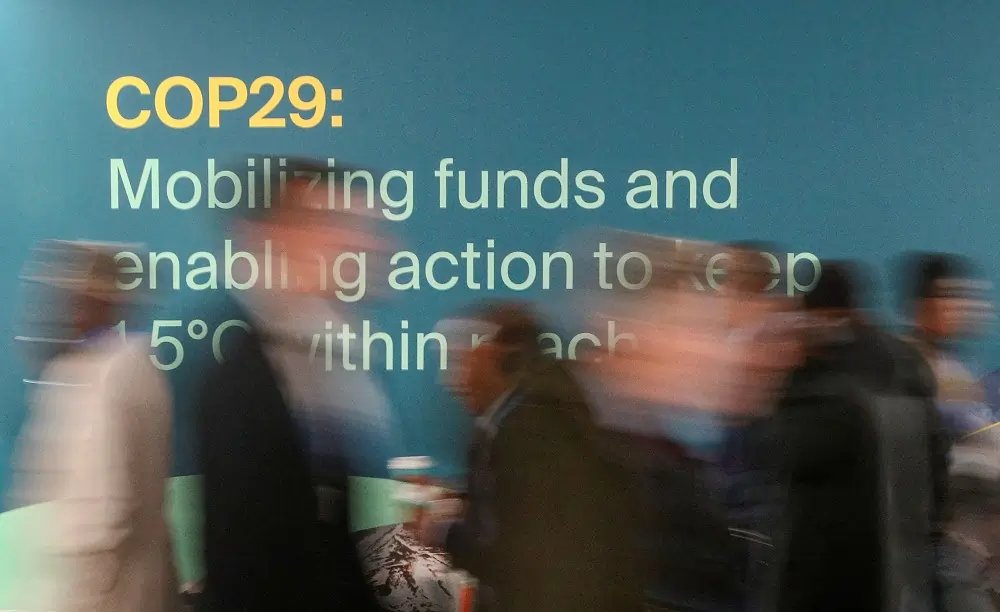Development bank financing pledge gives COP29 summit early boost
Published by Jessica Weisman-Pitts
Posted on November 13, 2024
3 min readLast updated: January 28, 2026

Published by Jessica Weisman-Pitts
Posted on November 13, 2024
3 min readLast updated: January 28, 2026

By Valerie Volcovici and Virginia Furness
BAKU (Reuters) – COP29 negotiators welcomed a pledge by major development banks to lift funding to poor and middle-income countries struggling with global warming as an early boost to the two-week summit.
A group of lenders, including the World Bank, announced on Tuesday a joint goal of increasing this finance to $120 billion by 2030, a roughly 60% increase on the amount in 2023.
“I think it’s a very good sign,” Irish Climate Minister Eamon Ryan told Reuters on Wednesday.
“It’s very helpful. But that on its own won’t be enough”, Ryan said, adding countries and companies must also contribute.
China’s Vice Premier Ding Xuexiang said on Tuesday that Beijing has already mobilized around $24.5 billion to help developing countries address climate change.
Ryan’s view was echoed by Patrick Verkooijen, CEO of the Global Center on Adaptation who welcomed the announcement as “a shot in the arm for the climate finance discussion”
“But there is so much more work ahead,” he added.
The chief aim of the conference in Azerbaijan is to secure a wide-ranging international climate financing agreement that ensures up to trillions of dollars for climate projects.
Developing countries are hoping for big commitments from rich, industrialized nations that are the biggest historical contributors to global warming, and some of which are also huge producers of fossil fuels.
“Developed countries have not only neglected their historical duty to reduce emissions, they are doubling down on fossil-fuel-driven growth,” said climate activist Harjeet Singh.
Wealthy countries pledged in 2009 to contribute $100 billion a year to help developing nations transition to clean energy and adapt to the conditions of a warming world.
But those payments were only fully met in 2022 and the pledge expires this year.
‘GET IT DONE’
Hopes for a strong deal have been dimmed by Donald Trump’s U.S. election win. The President-elect has promised to again withdraw the U.S. from international climate cooperation.
The United States is already the world’s largest oil and gas producer and Trump has vowed to maximize output.
Officials representing President Joe Biden’s outgoing administration at COP29 have said China and the European Union may need to pick up the slack if Washington cedes leadership.
“We have a clear choice between a safer, cleaner, fairer future and a dirtier, more dangerous, and more expensive one. We know what to do. Let’s get to work. Let’s get it done,” U.S. climate envoy John Podesta told the conference.
With 2024 on track to be the hottest year on record, scientists say global warming and its impacts are unfolding faster than expected.
Climate-fuelled wildfires forced evacuations in California and triggered air quality warnings in New York. In Spain, survivors are coming to terms with the worst floods in the country’s modern history.
Indigenous leaders from Brazil, Australia, the Pacific and Eastern Europe said on Wednesday they intend to work together to ensure indigenous people have a say in future climate decisions.
The group said it was pushing for an indigenous co-presidency at next year’s COP, which is meant to be held in Brazil’s Amazon, as well as at future COP conferences.
Albania’s Prime Minister Edi Rama told the conference he was concerned that the international process to address global warming, now decades old, was not moving swiftly enough.
“Life goes on with its old habits, and our speeches, filled with good words about fighting climate change, change nothing,” Rama said.
(Writing by Richard Valdmanis; Editing by Alexander Smith)
Climate finance refers to the financial resources allocated to support projects and initiatives aimed at mitigating climate change and adapting to its impacts, particularly in developing countries.
Developing countries are nations with a lower GDP per capita and lower Human Development Index (HDI) compared to developed countries, often facing challenges like poverty and lack of infrastructure.
COP29 is the 29th annual Conference of the Parties to the United Nations Framework Convention on Climate Change, where global leaders gather to discuss and negotiate actions to combat climate change.
Explore more articles in the Banking category











